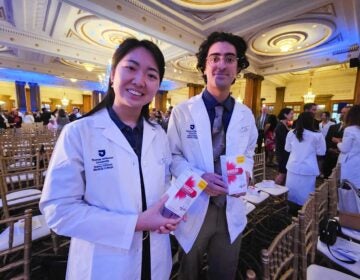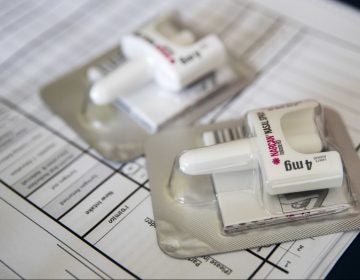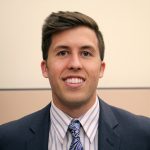N.J. pharmacies see big turnout for free naloxone
New Jersey officials distributed 20,000 free naloxone packs to pharmacies, and said Tuesday’s event was a pilot program that could be expanded in the future.

File photo: Anthony Minniti, a pharmacist and the owner of Bell Pharmacy in Camden, displays some of the educational material he handed out to people claiming free doses of naloxone on Tuesday, June 18, 2019. (Nicholas Pugliese/WHYY)
Since John Power lost his 23-year-old son to an opioid overdose three years ago, the Burlington County pharmacist has urged as many families as possible to get naloxone, the opioid overdose reversal drug.
In his years of advocacy, though, he had never seen anything like the activity at his Browns Mills store on Tuesday, when more than 80 people stopped in to pick up free two-dose boxes of the medicine.
“This trumped any naloxone I have given out in the past at least year and a half, in one day,” Powers said. “That’s a very powerful statement to the numbers of people who are out there who are quiet and in the shadows.”
A similar scene played out Tuesday at many of the 170 pharmacies across New Jersey that participated in a one-day experiment by the state to help counter a drug-overdose epidemic that claimed more than 3,100 lives in New Jersey last year.
Customers, who were able to claim a pack of naloxone anonymously and without a prescription, said they were doing so to protect themselves, loved ones, or complete strangers.
“All three of my nephews have a heroin problem, so it’s just easier to have it around in case anything happens,” said Kyle, a middle-aged Mount Laurel resident who declined to give his last name, at Larchmont Pharmacy in his hometown.
“You could probably just walk down the street and see somebody on some type of drug, the area we live in,” said Damiar Riley, 19, outside Bell Pharmacy in Camden. “Never know when somebody might be overdosing. So this is strictly for helping other people.”
Naloxone, commonly known by the brand name Narcan, is easy to use and rapidly reverses the effects of an opioid overdose. First responders in New Jersey administered the drug more than 16,000 times last year, according to state data.
The type distributed Tuesday is a nasal spray that pharmacists said does not have negative side effects if taken by an adult or child that doesn’t need it.
Power said the medicine “is not the panacea to end this epidemic,” but it can give people and families suffering with addiction another chance at life.
“And maybe one day they will overcome that and have the opportunity to pay forward to someone else,” he said.
Anthony Minniti, a pharmacist and the owner of Bell Pharmacy in Camden, stressed that naloxone is not just for addicts. He said anyone prescribed opioids for pain or other conditions should also have it, especially elderly patients who may accidentally take more doses than they should.
“Just because you receive a medication from your physician, doesn’t mean it’s 100% safe or there can’t be an accidental overdose,” he said.
The day’s events were not without some controversy. Kyle, the Mount Laurel resident, asked why the state could hand out naloxone for free, but not medications for conditions like diabetes.
Another man picking up a box of Narcan worried it would be used by addicts as a “crutch,” allowing them to use drugs recklessly without fear of a deadly overdose.
Minniti, the Camden pharmacist, disagreed with that way of thinking.
“The cynical side of the public seems to say, ‘Oh, well, you’re just taking away consequences,’” he said. “Do we really want the death penalty for people who might make a mistake?”
All told, New Jersey distributed 20,000 packs of naloxone to pharmacies Tuesday, according to state officials. They said Tuesday’s event was a pilot program that could be expanded in the future.
New Jersey, as well as other states including Pennsylvania, already have authorized “standing orders” that allows certain pharmacies to distribute naloxone without a prescription. Pharmacies still require people to pay for the drug, either out of pocket or through insurance coverage or Medicaid.
New Jersey Department of Health Commissioner Shereef Elnahal, who visited Power at his pharmacy on Tuesday, said a generic dose of naloxone can cost $20 to $40, while a branded version can cost up to $200.
“It’s not insignificant,” he said. “It can be a cost burden on folks, so that’s why today’s so important.”
WHYY is your source for fact-based, in-depth journalism and information. As a nonprofit organization, we rely on financial support from readers like you. Please give today.





